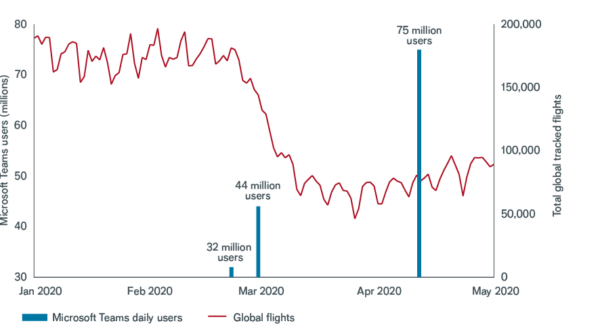Aug
2020
Sustainability and digitalisation: speeding the transition to a low carbon world
DIY Investor
29 August 2020


Hamish Chamberlayne
Key Takeaways:
- The COVID-19 crisis has highlighted, and in some instances advanced, the developments made in the digital space and has proven society’s ability to function effectively in a low carbon way.
- The pace of the transition to a low carbon economy is ramping up, exemplified by new climate laws enacted in the EU, and we believe it is important to be aligned with this sustainable future.
- Exciting advancements in the efficiency of battery technology for electric vehicles could take us one step closer to achieving a low carbon economy.
For the past six months COVID-19 has changed the way that we live and operate across the world. Shelter in place orders and governmental lockdowns have been implemented globally causing unprecedented economic and social dislocation.
But this dislocation has not been uniform. Many people and businesses have been quick to adapt to a world of travel restrictions and social distancing. The common link to this economic resilience is digitalisation.
From productivity to entertainment to health, digitalisation has provided the means to carry on. Cloud computing, cashless payments and online everything are features of the digital economy that have enabled us to live and succeed in a way like never before.
And while the ‘digitalisation of everything’ is not new, the crisis has certainly highlighted the developments that have already been made, even accelerating them in some instances.
It is a structural shift that has been happening for a long time, now spurred on by the crisis, and we believe that it is key to reaching a sustainable economy.
Digital platforms spurred on by the crisis
Microsoft CEO Satya Nadella recently summed this up well in his most recent earnings call in April, stating that the company experienced “two years of digital transformation in two months”, and the figures tell the same story.
In March alone, the Microsoft Azure blog reported a 775% increase in cloud computing usage in regions with social restrictions and a spike in Microsoft Teams users, with 900 million minutes of meetings and calls made in a one-week period (as at 28 March 2020).
But this is just the tip of the iceberg in terms of digital uptake. From online groceries to telemedicine to remote working and virtual classrooms, many people will have experienced digital platforms for the first time.
But are these platforms powerful enough to sustain a lasting change in customer interaction once the crisis abates?
It is our belief that companies that enable greater productivity and a more efficient use of the world’s precious natural resources will succeed over the long term.
We consider digitalisation and sustainability to be two sides of the same coin by empowering people and businesses to work, live and succeed effectively without the need for an excessive carbon footprint.
If any good has come out of this crisis, it is that it has served to underline the idea that many people are able to lead lower carbon lives effectively.
AS FLIGHTS PLUMMET, MICROSOFT TEAMS USERSHIP SOARS

Source: Flightradar24.com total number of flights tracked by flightradar24 per day from 20 January 2020 to 18 May 2020. Microsoft Teams users figures from Microsoft press releases and earnings call as at 20 May 2020.
Some sectors fared worse than others in the crisis – namely travel, transportation and heavy industrials.
Airlines and cruise liners ground to a halt and were among the most severely affected as social distancing measures and travel bans were enacted across the world, with global air traffic dropping by 65% in the one month period to 7 April according to a snapshot of flights in the air by flightradar24.com.
While lockdown has exposed the weaknesses in this industry, we believe that it has only accelerated an already existing, and in our opinion unstoppable, transition to a low carbon economy as new technologies develop and the regulatory burden associated with carbon intensifies.
In fact, amid the COVID-19 panic, the EU unveiled plans for a new climate law that will commit countries to reduce net greenhouse gas emissions to zero by 2050.[1] Ursula von der Leyen,
President of the European Commission, announced on 4 March in Brussels that this was a “political commitment and sets us irreversibly on the path to a more sustainable future”, echoing our view.
Game changing battery technology
One area where we are seeing exciting steps towards a low carbon world is the advances in battery technology.
Over the course of the last year there have been a number of research papers that point to potentially game changing developments in the world of batteries in electric vehicles.
Currently, one of the biggest problems with batteries is the trade-off between combining high energy density with battery longevity and safety. Studies, however, show that we are reaching a stage where these issues can be solved.
At the materials level, research has indicated that cobalt, an expensive but necessary resource, could potentially be designed out of batteries with new material technology.
Are we finally close to the time where both the performance and cost of batteries reach a point that catalyses widespread consumer adoption of electric cars?
Elon Musk’s ‘million-mile battery’ is perhaps not as far away as once believed and it is developments like this that take us closer to functioning in a low carbon economy.
We are living in a period of such exceptional change – characterised by the digitalisation of everything and the transition to a low carbon economy – and while the COVID-19 crisis may have highlighted, and in some cases accelerated these trends, we believe that they are structural shifts that were happening long before the crisis and will continue long after.
We see a strong link between sustainable development, innovation and long-term compounding growth. Our investment framework seeks to invest in companies that have a positive impact on the environment and society, while at the same time helping us stay on the right side of disruption and benefit our investors.
Click to visit:
These are the views of the author at the time of publication and may differ from the views of other individuals/teams at Janus Henderson Investors. Any securities, funds, sectors and indices mentioned within this article do not constitute or form part of any offer or solicitation to buy or sell them.
Past performance is not a guide to future performance. The value of an investment and the income from it can fall as well as rise and you may not get back the amount originally invested.
The information in this article does not qualify as an investment recommendation.
For promotional purposes.
Commentary » Equities Commentary » Investment trusts Commentary » Latest » Mutual funds Commentary » Mutual funds Latest
Leave a Reply
You must be logged in to post a comment.